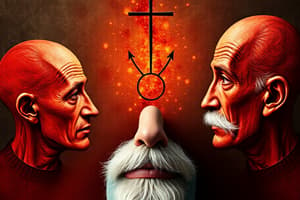Podcast
Questions and Answers
Who proposed the concept of collective unconscious and archetypes?
Who proposed the concept of collective unconscious and archetypes?
- Erich Fromm
- Carl Jung (correct)
- Sigmund Freud
- Alfred Adler
What is the primary focus of Adler's Individual Psychology?
What is the primary focus of Adler's Individual Psychology?
- Striving for superiority (correct)
- Psychological types
- Unconscious mind
- Social interest
Which theorist is associated with the concept of self-actualization?
Which theorist is associated with the concept of self-actualization?
- Carl Rogers
- Rollo May
- Erik Erikson
- Abraham Maslow (correct)
What is the core concept of Sullivan's Interpersonal Theory?
What is the core concept of Sullivan's Interpersonal Theory?
Which theory is associated with the concept of trait theory?
Which theory is associated with the concept of trait theory?
Who developed the concept of evolutionary psychology?
Who developed the concept of evolutionary psychology?
What is the primary focus of Rogers' Person-Centered Theory?
What is the primary focus of Rogers' Person-Centered Theory?
Who developed the concept of personal construct theory?
Who developed the concept of personal construct theory?
Study Notes
Psychoanalytic Theories
- Chapter 2: Freud's Psychoanalysis focuses on the unconscious mind, defense mechanisms, and psychosexual stages.
- Chapter 3: Adler's Individual Psychology emphasizes striving for superiority, social interest, and style of life.
- Chapter 4: Jung's Analytical Psychology explores the collective unconscious, archetypes, and psychological types.
- Chapter 5: Klein's Object Relations Theory discusses internal objects, positions, and defense mechanisms.
- Chapter 6: Horney's Psychoanalytic Social Theory covers basic anxiety, neurotic needs, and feminine psychology.
- Chapter 7: Fromm's Humanistic Psychoanalysis examines human needs, character orientations, and freedom.
- Chapter 8: Sullivan's Interpersonal Theory is centered on interpersonal relations, anxiety, and developmental epochs.
- Chapter 9: Erikson's Post-Freudian Theory presents psychosocial stages, identity crisis, and ego development.
Humanistic/Existential Theories
- Chapter 10: Maslow's Holistic-Dynamic Theory features a hierarchy of needs and self-actualization.
- Chapter 11: Rogers' Person-Centered Theory focuses on self-concept, conditions of worth, and unconditional positive regard.
- Chapter 12: May's Existential Psychology explores anxiety, guilt, existential concerns, and freedom.
Dispositional Theories
- Chapter 13: Allport's Psychology of the Individual emphasizes trait theory, functional autonomy, and individual uniqueness.
- Chapter 14: Eysenck, McCrae, and Costa's Trait and Factor Theory presents the Big Five personality traits and biological bases of personality.
Biological/Evolutionary Theories
- Chapter 15: Buss' Evolutionary Theory of Personality explores evolutionary psychology, adaptive behaviors, and mating strategies.
Learning Theories
- Chapter 16: Skinner's Behavioral Analysis is based on operant conditioning, reinforcement, and behavior modification.
- Chapter 17: Bandura's Social Cognitive Theory emphasizes observational learning, self-efficacy, and reciprocal determinism.
- Chapter 18: Rotter and Mischel's Cognitive Social Learning Theory covers expectancies, locus of control, and cognitive-affective units.
- Chapter 19: Kelly's Psychology of Personal Constructs explores personal construct theory, cognitive processes, and construct systems.
Studying That Suits You
Use AI to generate personalized quizzes and flashcards to suit your learning preferences.
Description
Learn about the psychoanalytic theories of famous psychologists such as Freud, Adler, Jung, Klein, Horney, and Fromm. Understand the concepts of unconscious mind, defense mechanisms, and psychological types.




